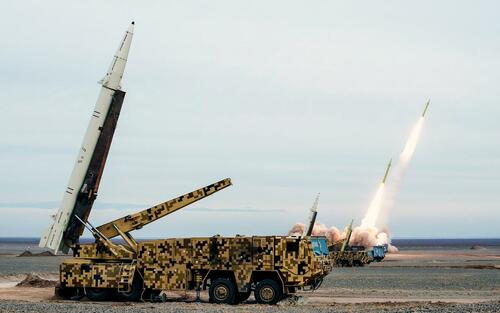
As another reminder of how these already dangerous and volatile wars in the Middle East and Eastern Europe are inter-connected, United States officials are slamming the Iranian government in the wake of fresh reports saying Tehran has transferred short-range ballistic missiles to Russia.
The Wall Street Journal was the first to report Friday that "Iran has sent short-range ballistic missiles to Russia, according to U.S. and European officials, a move that gives Moscow another potent military tool in its war against Ukraine and follows stern Western warnings not to provide those arms to Moscow."
The Pentagon and US intelligence has for months been warning about such a possibility, and has been threatening Iran over the potential move, but a US official has now "confirmed" to the WSJ that the missiles "have finally been delivered." The Biden White House has said "a severe response" to Tehran awaits.

NATO countries led by the US have been warning of swift and severe consequences, but the reality is at this point there's not too much left to sanction in either the Islamic Republic or Russia. Both are a couple of the most highly sanctioned countries on earth, which has only resulted in their deepening their relations, and turning to BRICS and non-aligned Global South countries. Group of 7 countries have said they will coordinate to punish Iran if missile deliveries to Russia's armed forces go through.
It's long been well-known that Russia has received thousands of Iranian kamikaze drones, which have for the last two-and-a-half years been a feature of the aerial assault on Ukrainian cities. The Islamic Republic is even helping Russia manufacture drones inside Russia.
The WSJ notes of the sensitive political timing of the alleged ballistic missile transfer and also the potential impact to the 'moderate' Pezeshkian administration on the global stage:
The missile deliveries also could have implications for the hopes of the new Iranian government to tamp down tensions with the West. The country’s new president, Masoud Pezeshkian, has said he hopes to improve the domestic economy by winning sanctions relief from Europe and the U.S.
But at this rate, this hoped-for sanctions relief is surely not going to happen. Late Friday, Iran issued a formal rejection of the contents of the WSJ report and the allegations of Western officials:
In a statement shared with Newsweek, however, the Iranian Mission to the United Nations stated that Iran had not provided weapons to either side of the conflict in Ukraine and called on other nations to cease doing so.
"Iran's position vis-à-vis the Ukraine conflict remains unchanged," the Iranian Mission said. "Iran considers the provision of military assistance to the parties engaged in the conflict—which leads to increased human casualties, destruction of infrastructure, and a distancing from ceasefire negotiations—to be inhumane."
"Thus, not only does Iran abstain from engaging in such actions itself but it also calls upon other countries to cease the supply of weapons to the sides involved in the conflict," the statement added.
We recently highlighted that Russia has appeared to step up supplies of air defense equipment to the Islamic Republic, at a moment Tehran is still threatening possible massive retaliation attacks on Israel for the July 31 killing of Hamas leader Ismail Haniyeh in Tehran. The expectation in such a scenario is that Israel's counter-response would be bigger. And yet for now it seems this escalation scenario has waned, given that over a month has passed and there's been no big strikes.
The Iranians are reportedly also pressuring Moscow to fulfill delivery of Su-35S fighter jet fighters which were previously pledged in a defense deal, given the regional temperature is heating up fast.
Moscow likely feels obliged given the significant Iranian drone transfers it has received throughout the course of the Ukraine war. Iran has heavily aided Russian forces, and now Russia is quickly coming to Iran's assistance.
As another reminder of how these already dangerous and volatile wars in the Middle East and Eastern Europe are inter-connected, United States officials are slamming the Iranian government in the wake of fresh reports saying Tehran has transferred short-range ballistic missiles to Russia.
The Wall Street Journal was the first to report Friday that “Iran has sent short-range ballistic missiles to Russia, according to U.S. and European officials, a move that gives Moscow another potent military tool in its war against Ukraine and follows stern Western warnings not to provide those arms to Moscow.”
The Pentagon and US intelligence has for months been warning about such a possibility, and has been threatening Iran over the potential move, but a US official has now “confirmed” to the WSJ that the missiles “have finally been delivered.” The Biden White House has said “a severe response” to Tehran awaits.

NATO countries led by the US have been warning of swift and severe consequences, but the reality is at this point there’s not too much left to sanction in either the Islamic Republic or Russia. Both are a couple of the most highly sanctioned countries on earth, which has only resulted in their deepening their relations, and turning to BRICS and non-aligned Global South countries. Group of 7 countries have said they will coordinate to punish Iran if missile deliveries to Russia’s armed forces go through.
It’s long been well-known that Russia has received thousands of Iranian kamikaze drones, which have for the last two-and-a-half years been a feature of the aerial assault on Ukrainian cities. The Islamic Republic is even helping Russia manufacture drones inside Russia.
The WSJ notes of the sensitive political timing of the alleged ballistic missile transfer and also the potential impact to the ‘moderate’ Pezeshkian administration on the global stage:
The missile deliveries also could have implications for the hopes of the new Iranian government to tamp down tensions with the West. The country’s new president, Masoud Pezeshkian, has said he hopes to improve the domestic economy by winning sanctions relief from Europe and the U.S.
But at this rate, this hoped-for sanctions relief is surely not going to happen. Late Friday, Iran issued a formal rejection of the contents of the WSJ report and the allegations of Western officials:
In a statement shared with Newsweek, however, the Iranian Mission to the United Nations stated that Iran had not provided weapons to either side of the conflict in Ukraine and called on other nations to cease doing so.
“Iran’s position vis-à-vis the Ukraine conflict remains unchanged,” the Iranian Mission said. “Iran considers the provision of military assistance to the parties engaged in the conflict—which leads to increased human casualties, destruction of infrastructure, and a distancing from ceasefire negotiations—to be inhumane.”
“Thus, not only does Iran abstain from engaging in such actions itself but it also calls upon other countries to cease the supply of weapons to the sides involved in the conflict,” the statement added.
We recently highlighted that Russia has appeared to step up supplies of air defense equipment to the Islamic Republic, at a moment Tehran is still threatening possible massive retaliation attacks on Israel for the July 31 killing of Hamas leader Ismail Haniyeh in Tehran. The expectation in such a scenario is that Israel’s counter-response would be bigger. And yet for now it seems this escalation scenario has waned, given that over a month has passed and there’s been no big strikes.
The Iranians are reportedly also pressuring Moscow to fulfill delivery of Su-35S fighter jet fighters which were previously pledged in a defense deal, given the regional temperature is heating up fast.
Moscow likely feels obliged given the significant Iranian drone transfers it has received throughout the course of the Ukraine war. Iran has heavily aided Russian forces, and now Russia is quickly coming to Iran’s assistance.
Loading…





